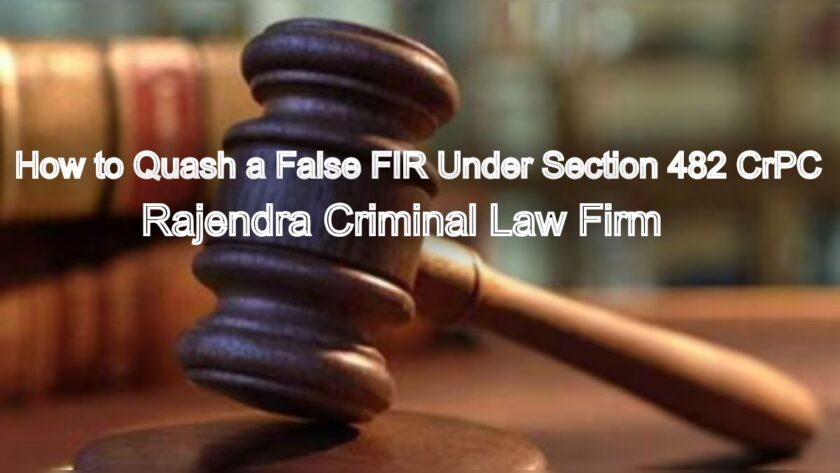How to Quash a False FIR? A First Information Report (FIR) is the first step in a criminal investigation. It can be a very powerful legal instrument. However, it can also be misused. A false or frivolous FIR can be filed with malicious intent. It can be used to harass, intimidate, or settle personal scores. When this happens, an innocent person’s reputation and liberty are at risk. In these critical situations, the law provides a powerful remedy. This remedy is the quashing of the FIR. Section 482 of the Code of Criminal Procedure (CrPC) grants this power to the High Courts. The Madras High Court, therefore, can intervene. It can prevent the abuse of the legal process. Rajendra Criminal Law Firm specializes in this area. Our expert legal team has a deep understanding of criminal procedure.
Fighting for Justice: Quashing a False FIR in the Madras High Court
The Inherent Power of the High Court
First and foremost, Section 482 CrPC is the cornerstone of this legal strategy. This section explicitly states that nothing in the CrPC shall limit or affect the inherent powers of the High Court. The High Court, therefore, can make orders as may be necessary. This is to give effect to any order under the Code. It is also to prevent the abuse of the process of any court. Most importantly, it is to secure the ends of justice. This power is not a new invention. It is an inherent part of the High Court’s judicial authority. It is used sparingly and with great caution. However, it is an invaluable tool for an innocent person. It helps them get relief from a false criminal case.
The Grounds for Quashing an FIR
A petition under Section 482 CrPC cannot be filed on a whim. The Supreme Court has laid down specific grounds for quashing an FIR. Our legal team meticulously builds a case based on these grounds. We rely on the landmark judgment of State of Haryana v. Bhajan Lal. This case established a clear set of categories. For example, if the allegations in the FIR do not disclose a cognizable offense, the FIR can be quashed. Similarly, if the allegations are so absurd and improbable that no prudent person can conclude there is sufficient ground for a proceeding, we can quash it. Furthermore, if the criminal proceeding is manifestly attended with mala fide intent, we challenge its legality. We prove that the FIR was filed with an ulterior motive. A personal grudge, for instance, is a common motive.
The Evidence-Based Approach
Our approach begins with a careful examination of the FIR itself. We analyze the allegations. We check if they fit the ingredients of the offense alleged. For instance, in a cheating case under Section 420 IPC, we must show that there was no dishonest intention from the very beginning. We also gather external evidence. This includes documentary evidence and witness statements. We may, for example, present a written contract or bank statements. This evidence proves the innocence of our client. It shows that the allegations in the FIR are false. The High Court, while not conducting a mini-trial, can look at this evidence. It can use it to determine if a prima facie case exists. If the evidence on record clearly and manifestly fails to prove the charges, the FIR is quashed.
The Process at the Madras High Court
The process starts with drafting a quashing petition. This is a crucial step. The petition must be comprehensive. It must detail the facts of the case. It must also articulate the legal grounds for quashing the FIR. We attach all supporting documents. This includes the FIR copy and any evidence that proves our client’s innocence. We then file the petition in the Madras High Court. The court will issue notice to the respondents. This includes the State and the complainant. After the respondents file their counter-affidavits, the court hears the arguments. We present our case. We highlight the lack of a prima facie case. Also expose the malicious intent behind the FIR. We, therefore, seek an interim stay on the investigation. This protects our client from unnecessary harassment.
The Nuances of Criminal Law
Quashing an FIR is not a simple process. It requires a deep understanding of criminal law. For example, the High Court will be cautious if the FIR relates to a serious or heinous offense. In such cases, the court may allow the investigation to proceed. However, for disputes of a civil nature that have been given a criminal color, the High Court is more likely to intervene. A commercial dispute is a good example of this. If a business dispute is dressed up as a criminal case of cheating, we can quash the FIR. We show that the dispute is purely civil. We, therefore, prevent the abuse of criminal law for civil matters.
Our Commitment to Securing Justice
At Rajendra Criminal Law Firm, our commitment is unwavering. We understand the mental and financial toll of a false criminal case. We provide clear and compassionate legal counsel. Keep our clients informed at every stage. We leverage our expertise and experience in the Madras High Court. We build strong, evidence-based arguments. Cite relevant judgments from the Supreme Court. We fight to protect the liberty and reputation of our clients. We, therefore, ensure that the power of Section 482 is used for its intended purpose. This purpose is to secure justice and prevent injustice.
Frequently Asked Questions
“Quashing an FIR” means to invalidate or nullify it through a court order. The legal basis for this is Section 482 of the Code of Criminal Procedure (CrPC). This section grants the High Court inherent powers to quash an FIR if it is a manifest abuse of the legal process.
The Supreme Court, in the landmark Bhajan Lal judgment, established several grounds. An FIR can be quashed if the allegations are so vague that they don’t disclose an offense, or if they are so improbable that no reasonable person would believe them.
Yes, it is possible. A petition under Section 482 can be filed at any stage, even after the police have filed a charge sheet. However, the High Court will be more cautious as the investigation would have progressed.
To prove a false FIR, you must present irrefutable evidence. This includes documentary evidence like written agreements, bank statements, or official communications that contradict the allegations in the FIR.
The duration of the process can vary significantly based on the complexity of the case and the High Court’s schedule. It can range from a few months to over a year. Our legal team, however, aims to expedite the process by seeking an interim stay on the investigation as soon as the petition is filed.
Conclusion
In conclusion, a false FIR can be a devastating experience. However, it is not the end of the road. Section 482 CrPC provides a potent weapon to fight back. With the right legal team, you can quash a false FIR. Rajendra Criminal Law Firm has the knowledge and experience to handle these cases. We will meticulously analyze your case. We will build a powerful legal strategy. Will argue your case persuasively in the Madras High Court. We commit to securing your justice. We will ensure that a malicious FIR does not ruin your life.
Read More
- Supreme Court Stays: When and How to Get One for Ongoing Cases
- Landmark Judgments of Supreme Court in Criminal Law (2024–2025)
- Can You Approach the Supreme Court Directly for Fundamental Rights Violation?
- Supreme Court Guidelines on Arrests and Bail: What Every Accused Must Know
- How to File a Special Leave Petition (SLP) in the Supreme Court – Step by Step Guide
- Madras High Court:





